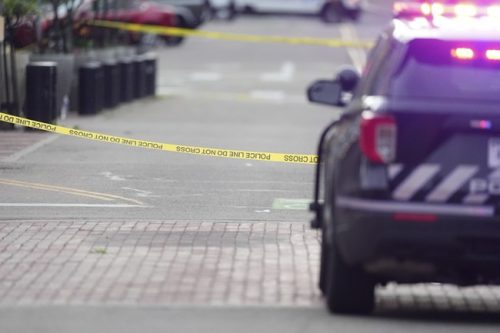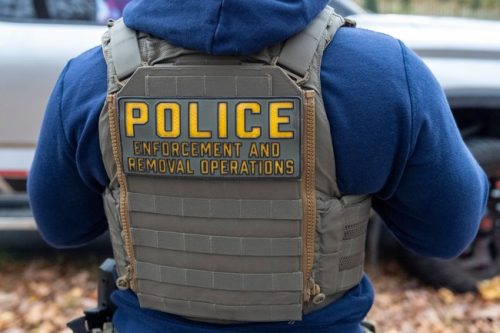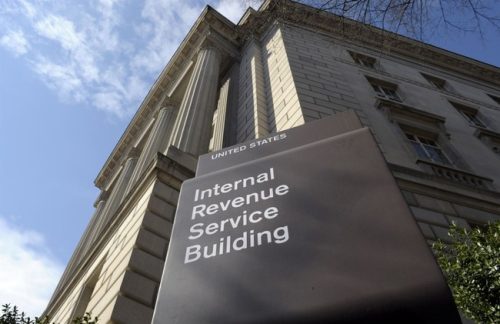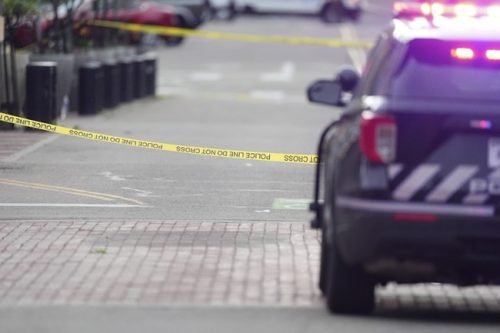Mayor-elect Zohran Mamdani drew fire after anti-Israel protesters mobbed a Manhattan synagogue, and he suggested the synagogue’s event “violated international law,” a claim that rattled Jewish leaders who say congregants were intimidated while exercising their rights.
On Wednesday night, large pro-Palestinian crowds gathered outside Park East Synagogue in New York while the congregation hosted an event about immigration to Israel organized by Nefesh B’nefesh. Witnesses say protesters blocked people from entering and created a chaotic, threatening scene around the building. A 93-year-old Holocaust survivor, Rabbi Arthur Schneier, was among those inside when the demonstrators showed up.
Protest leaders used inflammatory language on site that alarmed attendees and observers. “It is our duty to make them think twice before holding these events,” one leader told the crowd. Another said, “We need to make them scared. We need to make them scared. We need to make them scared,” while the crowd chanted, “From New York to Gaza, globalize the intifada.”
Instead of focusing only on the behavior of the mob, Mayor-elect Zohran Mamdani publicly faulted the synagogue and the organization hosting the event, saying the gathering “violated international law.” Here’s more: that comment has prompted fierce pushback from community leaders who see a disturbing shift in priorities when houses of worship are threatened.
Zohran Mamdani, the mayor-elect of New York City, distanced himself from a widely criticized demonstration outside a prominent synagogue in Manhattan on Wednesday night, where anti-Israel protesters were heard chanting “Death to the IDF” and “Globalize the intifada,” among other slogans, even as he suggested that the event, which provided information on immigrating to Israel, violated international law.
“The mayor-elect has discouraged the language used at last night’s protest and will continue to do so,” a spokesperson for Mamdani, Dora Pekec, said in a statement to Jewish Insider on Thursday. “He believes every New Yorker should be free to enter a house of worship without intimidation, and that these sacred spaces should not be used to promote activities in violation of international law.”
Mamdani previously described New York as “a city of international law” and even suggested that he would use that concept as grounds to arrest Israeli Prime Minister Benjamin Netanyahu if the prime minister visited the city. That rhetoric now looks like it will be applied to ordinary New Yorkers and organizations exercising their First Amendment rights, according to critics.
BREAKING @J_Insider via @matthewkassel: "Mamdani: Nefesh B’Nefesh event at NYC synagogue is ‘violation of international law’"
"Mamdani's statement comes as he distanced himself from anti-Israel protesters who demonstrated outside the synagogue event"https://t.co/O4MzY0rwHh
— Josh Kraushaar (@JoshKraushaar) November 20, 2025
“In NYC — the largest Jewish community outside Israel — singling out Jewish houses of worship is how double standards start. And once they start, they spread,” Goldsheft wrote. “This is the moment our allies need to show up. If we don’t push back now, this rhetoric becomes the norm. We can’t let that happen — not here, not ever.”
Hen Mazzig of the Tel Aviv Institute slammed Mamdani for suggesting a community event amounted to wrongdoing and for the broader implications of his remarks. Supporters of the synagogue and the organization that hosted the session say the focus should have been squarely on the demonstrators whose chants and intimidation threatened congregants.
“He decried the congregation for meeting to learn about Nefesh B’Nefesh and falsely claimed Jewish immigration to Israel is ‘in violation of international law,’ and they misused a ‘sacred space,'” Mazzig wrote. The lines between criticizing a foreign government and blaming private citizens for seeking community and safety cannot be blurred without consequences.
Mazzig added, “Clearly he does not know anything about ‘international law.’ There is nothing wrong with Jews immigrating to their homeland, let alone gathering in community while dozens of hateful protestors stand outside their doors hurling antisemitic insults and calling for violence against them.” Those words reflect deep frustration over what many see as misplaced official concern.
“Mamdani has NO right to dictate how Jews utilize our own community spaces — or condemn Jews for wanting to leave New York while he lets antisemitism run rampant through the city,” Mazzig added. The expectation from critics is simple: public officials should prioritize the safety of congregations and condemn violence and intimidation clearly and immediately.
From a conservative perspective, the episode highlights a worrying pattern where political framing can deflect blame away from violent or intimidating protest tactics. When city leaders raise legalistic objections to private community events instead of forcefully condemning mobs that target worshippers, it sends the wrong signal to residents already feeling vulnerable.
New Yorkers watching this play out expect straightforward protection for houses of worship and a mayor who will put public safety first. If leaders treat victims of street intimidation as policy problems rather than people in need of protection, they risk normalizing a chilling environment around religious and community life.






